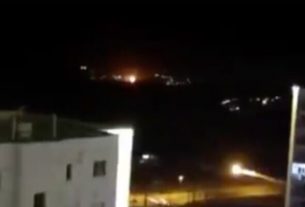When music producer Danny Gross first returned from nearly 100 days in reserve duty in Gaza, he didn’t want to make music. For the musician, who plays everything from the guitar to the piano to the double bass, it felt like music was not important enough to spend time on compared to the things he had done in the past few months, he explained.
“It took me a while to realize that it is okay for me to do what I am passionate about,” said Gross, explaining the process of returning from his long reserve duty and starting to rebuild his business.
During the Israel-Hamas War, Gross served in reserves as the loader in a tank. October 7 was a hectic day for Gross who recalls his team driving their tank 120 Kilometers down Highway 1 and Highway 6 in the middle of the night because they needed more tanks to fight in the Gaza Envelope, and the armored vehicle carriers were held up.
In the first month of the invasion of Gaza, his unit spearheaded the advance. “We were open to fire 180 degrees with no one to our right or left,” said Gross. “My platoon was the most southern in Gaza with no one in front of us.”
One of the things that helped Gross cope with the situation was music, which helped him decompress and disconnect from the reality of the battles in Gaza. Gross reflected on a battle in Gaza during which a soldier in his battalion was killed and his company commander was injured, saying that after this event, everyone around him was quiet and withdrawn.
“I felt like we needed to connect and bond,” said Gross, who said he used music to create this connection. “I decided that we were all going to have a good evening,” said Gross who then played music for everyone.
“There was like a line of 4 or 5 tanks and some infantry carriers and we were sitting behind them on a barricade made of sand by combat engineers, a little farther away from the active combat, playing loud music and making dinner. It was raining and no one cared, and we were all dancing and enjoying ourselves,” he describes, explaining the healing impact of having music in that moment.
Now that his reserve duty is over for the time being, Gross must start the process of rebuilding his music production business. “Even if I am paid back all the money I would have earned, I won’t get back any of the connections I would have made,” Gross explains.
At first, songs about the war “hit a little too close to home”
“I work with musicians who generally write their own music,” said Gross. “I counsel them through the process of creating music, from writing music and lyrics, arranging, recording and editing the music.
“The way I find musicians to work with is through social media, hours and hours creating content, and creating interactions [with musicians] online, so coming back from the war, I basically have to start from scratch,” said Gross.
“Any clients I had aren’t necessarily coming back, and many performances were shut down,” he added.
Those people who did want to make music during the war, often wanted to make songs about the war, which was hard for Gross at first because it “hit a little too close to home,” he explained. “I’m ready to make that kind of music now, if that is what artists want,” he says of his transition back to life after reserves.
“Just before the war, I started a transition in my career from working on big stages as a sound engineer to working more in the studio one-on-one,” said Gross, who has worked as a sound engineer on many of Israel’s biggest stages for its biggest artists. Gross now wants to help musicians find their way in the music industry. “I want to work with good people who are good musicians,” he said.
To contact Gross for business enquiries, visit his website: www.dannygross.co.il
Or his Instagram: @dannygross.prod




